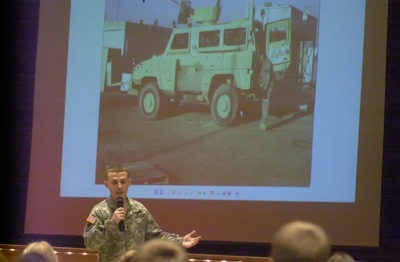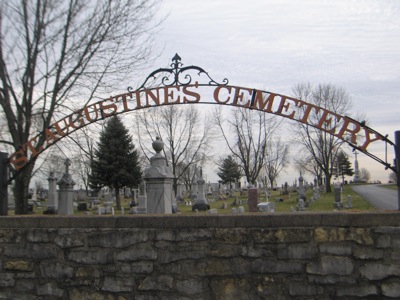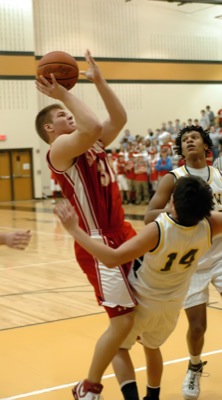Saturday, January 13th, 2007
Soldier speaks about duty in Iraq
By William Kincaid

Photo by Mark Pummell/The Daily Standard
Coldwater alumni Sargent Eric Ernst talks to Coldwater Elementary School students on Friday about his experiences while serving in Iraq.
COLDWATER - After manning the guard towers of Abu Ghraib in the blackness of night and surviving an attack on an armored vehicle, Coldwater High School alumni Sargent Eric Ernst is glad to be out of Iraq.
"I'm done," Ernst told a group of Coldwater Elementary School students Friday afternoon. "I don't have to go back to Iraq. I'm kind of happy about that."
Elementary teacher Marilyn Severt invited Ernst to talk about his experience in Bravo Company Fifth Engineering Battatallion to fourth- and fifth-grade students.
During a 14-month stint with Task Force Iron Claw, Ernst and his company were responsible for seeking and destroying the notorious IED explosive bombs hidden in the streets of Baghdad.
"IEDs are one of the major killers of soldiers," Ernst said. "If we didn't do it, there would be a lot more problems."
Ernst rode in an RG-31, mine-protected vehicle - usually in the gunner hatch - searching for explosives in "anything that looked out of place."
He said because it was a special unit and one of the army's highest priorities, his task force was equipped with one the military's most armored vehicle.
After locating a potential explosive - many times found in tractor-trailer tires, trash along the road or underneath the ground - the crew would call in the 15-foot Buffalo, what Ernst compared to an armored "Big Foot" monster truck. Using a hydraulic arm, the Buffalo would attempt to isolate the explosive before disarming it.
He said the RG-31 has a blower attached to the front that was used to clear away the excessive trash in the streets, as Iraq has no garbage service.
"If the box didn't move, it meant something was inside," he said.
Many times the explosives were activated by cell phones, Ernst said. Once the enemy observed the unit near the bomb, they would dial the cell phone and set off the explosive.
"Lives are more important than vehicles," he said about the importance of the RG-31 and Buffalo, which costs nearly $1 million. "The army saw us as an asset."
During one particular mission, Ernst's RG-31 was hit by an explosive, wounding him and four of his comrades, all who later received a Purple Heart medal.
"It's not a matter of if you get hit, it's a matter of when you get hit," Ernst said about those who have similar duties in the army.
His unit located 400 explosives during their missions
Ernst and his unit also was responsible for training Iraqi servicemen to some day take over these duties for themselves. But they always had to rely on Iraqi interpreters, who many times Ernst said he didn't trust, as they could be working for the other side.
He also told the students his worst experience was manning the guard tower at Abu Ghraib, one of the largest detainee centers in Iraq. The enemy would often try to attack the base with mortars.
"I did not like that place one bit," he said, pointing out that during one period he didn't sleep for 72 hours straight.
"They (enemy) were constantly trying to get their buddies out ... fortunately nothing bad happened," he said.
During the presentation, Enrst also showed the students some of the equipment he used in battle, including a bulletproof vest weighing more than 40 pounds and his helmet.
He also talked to the students about the many differences between the United States and Iraq. The temperature could vary from 130 to 40 degrees in Iraq. He also said it does actually rain in Iraq, but only during the season lasting from October to March. After that, not a drop of rain or a cloud in the sky.
But unlike the conception of Iraq as an arid desert, Ernst said there is green vegetation.
"I was so happy the first time I saw green grass in Iraq, I almost did jumping jacks," he recalled.
After his presentation, Ernst answered questions from the students.
One student asked what he liked best about Iraq, to which Ernst responded he would need some time to come up with an answer for that question. He later said the only thing he liked about the country was being with his fellow soldiers.
When asked if he thinks we should send more soldiers to Iraq, Ernst first applauded the complex question before stating his approval for the war.
"I think it is worth it, granted public support is low," he said. "For us to go over and liberate them was worth it."
Ernst, who has been in the armed forces for 10 years, said he now plans on joining the Coast Guard.



